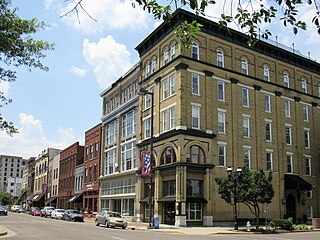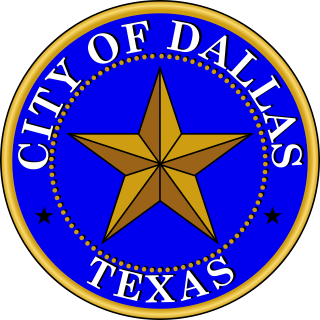
McCracken County is a county located in the far west portion of U.S. state of Kentucky. As of the 2020 census, the population was 67,875. The county seat and only municipality is Paducah. McCracken County was the 78th county formed in the state, having been created in 1825. It is part of the historic Jackson Purchase, territory sold by the Chickasaw people to General Andrew Jackson and Governor Isaac Shelby; this territory was located at the extreme western end of Kentucky.
In many countries, a mayor is the highest-ranking official in a municipal government such as that of a city or a town. Worldwide, there is a wide variance in local laws and customs regarding the powers and responsibilities of a mayor as well as the means by which a mayor is elected or otherwise mandated. Depending on the system chosen, a mayor may be the chief executive officer of the municipal government, may simply chair a multi-member governing body with little or no independent power, or may play a solely ceremonial role. A mayor's duties and responsibilities may be to appoint and oversee municipal managers and employees, provide basic governmental services to constituents, and execute the laws and ordinances passed by a municipal governing body. Options for selection of a mayor include direct election by the public, or selection by an elected governing council or board.

Paducah is a home rule-class city in and the county seat of McCracken County, Kentucky, United States. The largest city in the Jackson Purchase region, it is located at the confluence of the Tennessee and the Ohio rivers, halfway between St. Louis, Missouri, to the northwest and Nashville, Tennessee, to the southeast. As of the 2020 census, the population was 27,137, up from 25,024 during the 2010 U.S. Census. Twenty blocks of the city's downtown have been designated as a historic district and listed on the National Register of Historic Places.

The mayor of Los Angeles is head of the executive branch of the government of Los Angeles and the chief executive of Los Angeles. The office is officially nonpartisan, a change made in the 1909 charter; previously, both the elections and the office were partisan.

The Mayor of the City of Dallas is the head of the Dallas City Council. The current mayor is Eric Johnson, who has served one term since 2019 and is the 62nd mayor to serve the position. Dallas operates under a weak-mayor system, and a board-appointed city manager operates as the chief executive of the city.
The Charter Committee is an independent political organization dedicated to good government in Cincinnati, Ohio. Members of this committee are called Charterites. Committee organizers prefer the term Charter Committee rather than Charter Party. Because of Ohio State laws regarding vote percentage cutoffs for official party recognition, the Charter Committee is not an officially-recognized political party in Ohio.

The mayor of the City of San Diego is the official head and chief executive officer of the U.S. city of San Diego, California. The mayor has the duty to enforce and execute the laws enacted by the San Diego City Council, the legislative branch. The mayor serves a four-year term and is limited to two successive terms.
The Optional Municipal Charter Law or Faulkner Act provides New Jersey municipalities with a variety of models of local government. This legislation is called the Faulkner Act in honor of the late Bayard H. Faulkner, former mayor of Montclair, New Jersey and chairman of the Commission on Municipal Government.
A municipal council is the legislative body of a municipality or local government area. Depending on the location and classification of the municipality it may be known as a city council,town council, town board, community council, rural council,village council, or board of aldermen.
The government of Louisville, Kentucky, headquartered at Louisville City Hall in Downtown Louisville, is organized under Chapter 67C of the Kentucky Revised Statutes as a First-Class city in the state of Kentucky. Created after the merger of the governments of Louisville, Kentucky and Jefferson County, Kentucky, the city/county government is organized under a mayor-council system. The Mayor is elected to four-year terms and is responsible for the administration of city government. The Louisville Metro Council is a unicameral body consisting of 26 members, each elected from a geographic district, normally for four-year terms. The Mayor is limited to a two consecutive term limit, while members of the Louisville Metro Council are not term limited.

The government of Portland, Oregon is based on a city commission government system. Elected officials include the mayor, commissioners, and a city auditor. The mayor and commissioners are responsible for legislative policy and oversee the various bureaus that oversee the day-to-day operation of the city. Portland began using a commission form of government in 1913 following a public vote on May 3 of that year. Each elected official serves a four-year term, without term limits. Each city council member is elected at-large. In 2022, Portland residents approved a ballot measure to replace the commission form of government with a 12-member council elected in four districts using single transferable vote, with a professional city manager appointed by a directly-elected mayor, with the first elections to be held in 2024.
The state of Michigan is largely divided in the same way as many other U.S. states, but is distinct in its usage of charter townships. Michigan ranks 13th among the fifty states in terms of the number of local governmental entities.

Charles Kennedy Wheeler was a U.S. Representative from Kentucky.

The Lincoln Heritage Council (LHC) is a local council of the Boy Scouts of America serving 64 counties in four states: Kentucky, Indiana, Illinois, and Tennessee.

The Government of Saginaw, Michigan is a council-manager form of government with a mayor selected from members of the city council by members of the city council. Saginaw is classified as a home rule city under the Michigan Home Rule Cities Act which permits cities to exercise "home rule" powers, among which is the power to frame and adopt its own city charter which serves as the fundamental law of the city, in a manner similar to a constitution for a national or state government. The present charter was adopted in 1935 and took effect on January 6, 1936.

The following table lists the individuals who served as mayor of Hartford, Connecticut, their political party affiliations, and their dates in office, as well as other information.